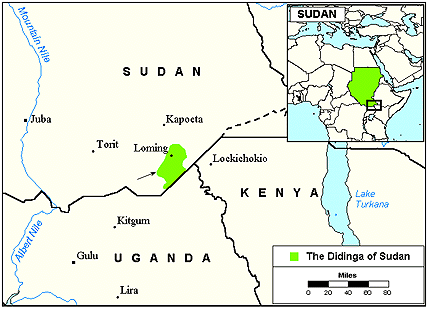|
|
Prayer Profile
The Didinga of Sudan
![[IMAGE]](../images3/0473.jpg) The Didinga occupy the Didinga Hills region in the southeastern corner of Sudan. They live in the valleys, on the plateaus and slopes, and on the adjacent plains of the region. Their neighbors include the Topotha, the Boya, and the Dongotona peoples; groups with whom the Didinga have had frequent conflicts due to economic pressures.
The Didinga occupy the Didinga Hills region in the southeastern corner of Sudan. They live in the valleys, on the plateaus and slopes, and on the adjacent plains of the region. Their neighbors include the Topotha, the Boya, and the Dongotona peoples; groups with whom the Didinga have had frequent conflicts due to economic pressures.
The Didinga, Boya, and Murle share a language that distinguishes them from all other groups in the Sudan. Their language, often called the Murle-Didinga language, is also spoken by a group living in southwest Ethiopia. The Didinga claim to have lived in southwest Ethiopia two hundred years ago. During their migration to the Didinga Hills, the Didinga, Murle, and Boya were one group. They lived in harmony in Sudan until a hunting-party dispute caused the Murle to leave. Later, a famine caused the Boya to withdraw. Today, though the groups have separated, their language remains the same.
What Are Their Lives Like?
For many years, the Didinga enjoyed a quiet, rural life. They took great pride in raising cattle and owned large herds that were supervised by the young single Didinga men. However, in 1963, a political disturbance which lasted until 1973 caused many Didinga to leave their cattle behind and to migrate to Uganda. While in Uganda, for the first time in their lives, Didinga were exposed to large-scale farming. Also, their children were introduced to education. These experiences created in the people the desires to make money and to gain knowledge, things which had been unimportant in the Hills.
When they returned to Sudan in 1973, the people were filled with a new vision for a more advanced life. They hoped to incorporate into their own culture many of the ideas and concepts they had learned in Uganda. They were met, however, with a drastic decrease in the numbers in their herds: clansmen who had remained in the Hills had failed to restock the cattle during the disturbance. Today, many Didinga are still working to enlarge their herds. They purchase cattle either through the exchange of grain or beer, or with money.
At present, farming and the desire for an education are as important to the Didinga as the herding of cattle is. The traditional values associated with raising cattle remain embedded in all Didinga. Many still take great pleasure in owning large herds. Their new-found hope for change that was brought back from their temporary migration also remains instilled in their daily lives.
The Didinga use their cattle not only as a means of wealth, but also for their milk that is consumed daily and made into butter. Didinga also consume fresh blood drawn from the necks of cattle with miniature arrows. The Didinga do not fish at all, because the eating of fish is taboo in their culture.
The Didinga live in scattered homesteads, with each clan grouped together. Homes are round with cone-shaped roofs. During certain seasons and during grazing periods, the Didinga also live in rustic camps.
An important aspect of Didinga society is the organization of "age-grades" for boys. Every three to five years, boys who are around eight years old are placed together to form a new "age-grade." These boys work and play together until they are married.
What Are Their Beliefs?
The Didinga are almost completely pagan. Their traditional beliefs and religious practices include having a tribal rainmaker who is entrusted with performing certain rituals to bring rain. Didinga also worship and sacrifice to spirits and gods and place great importance upon the worship of dead ancestors.
What Are Their Needs?
The Didinga have no Christian resources available to them, and a majority of them have never had an opportunity to hear the Gospel. Scriptures need to be translated into their language and Christian broadcasts need to be aired in their region. Missions works and prayers are the keys to making these needs a reality.
Prayer Points
- Ask the Lord of the harvest to send forth laborers into Didinga.
- Ask the Holy Spirit to grant wisdom and favor to the missions agencies that are presently working among the Didinga.
- Pray that Christian radio broadcasts, evangelical literature, and the Jesus film will be made available to the Didinga.
- Pray that God will reveal Himself to the Didinga through dreams and visions.
- Pray that God will give the Didinga believers boldness to share Christ with their own people.
- Take authority over the spiritual principalities and powers that are keeping the Didinga bound.
- Ask God to raise up prayer teams who will begin breaking up the soil through worship and intercession.
- Pray that strong local churches will be raised up among the Didinga.

Statistics
Latest estimates from the World Evangelization Research Center.
THE PEOPLE
- People name: Didinga
- Country: Sudan
- Their language: Didinga (Lango)
- Population:
- Largest religion:
- Christians: 2%
- Church members: 1,851
- Scriptures in their own language: None
- Jesus Film in their own language: None
- Christian broadcasts in their own language: None
- Mission agencies working among this people: 2
- Persons who have heard the Gospel: 26,800 (29%)
- Persons who have never heard the Gospel: 65,700 (71%)
THEIR COUNTRY
- Country: Sudan
- Population:
- Major peoples in size order:
- Major religions:
- Number of denominations: 20
© Copyright 1997
Bethany World Prayer Center
This profile may be copied and distributed without obtaining permission
as long as it is not altered, bound, published
or used for profit purposes.
![[HOME BUTTON]](../graphics/home.jpg)
![[CALENDAR BUTTON]](../graphics/calico.jpg)
![[LIST BUTTON]](../graphics/listico.jpg)
[Home]
[Calendar]
[Country List]
|